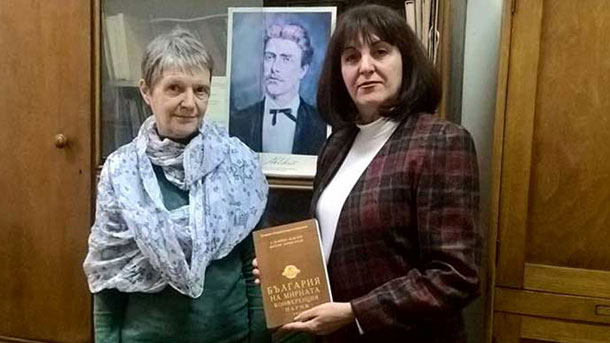On February 10, 1947 in Paris Bulgaria signed a peace treaty with the countries of the Anti-Hitler coalition that ended the country's participation in World War II. It was the result of the peace conference in Paris in the summer of 1946, at which over 20 countries decided the fate of the former allies of the Third Reich. Professor Eugenia Kalinova and Professor Iskra Baeva told us more about some important historical events.
Did Bulgaria manage to achieve its national goals with its participation in World War II?
"Initially we achieved them,” prof. Kalinova says. “When we became an ally of Germany on March 1, 1941 Bulgaria was allowed to enter with its troops and administration in the Aegean region (Western Thrace) and in Vardar Macedonia. In the eyes of the Bulgarian society this was the pinnacle of Bulgaria’s national  unification. In the shadow of this euphoria, however, remained the fact that these lands were given to for management until the end of the war not because of historical claims. From the standpoint of our national ideal - the unification, it seems that we were benefitting. There was another benefit - Bulgaria as a German ally did not participate in military actions against other countries. Bulgaria entered the territories of Greece and Yugoslavia after both countries had already capitulated. At the end of the war, however, the situation resembled that after World War I - Bulgaria was ins the group of defeated countries with all political, ideological and economic consequences that followed."
unification. In the shadow of this euphoria, however, remained the fact that these lands were given to for management until the end of the war not because of historical claims. From the standpoint of our national ideal - the unification, it seems that we were benefitting. There was another benefit - Bulgaria as a German ally did not participate in military actions against other countries. Bulgaria entered the territories of Greece and Yugoslavia after both countries had already capitulated. At the end of the war, however, the situation resembled that after World War I - Bulgaria was ins the group of defeated countries with all political, ideological and economic consequences that followed."
According to prof. Baeva we cannot talk about a third national catastrophe:
"Bulgaria is the only country of the losing coalition that not only did not lose territories but expanded its lands, thanks to the Treaty of Craiova (from September 7, 1940) and the accession of Southern Dobrudzha. There are countries participating on the side of the victorious coalition whose territories were reduced after the war. Placed in the Soviet sphere of influence, Bulgaria had defenders at the Paris Peace Conference in the face of the big winner. This country was not isolated, but had the support of Poland and Czechoslovakia and this had a favourable effect in the negotiations. "Bulgaria also had Yugoslav support, but for a very high price – it was forced to agree to a policy of "cultural autonomy" of Pirin Macedonia.
The summer of 1946 was crucial for Bulgarian diplomacy, but also coincided with internal political problems. Prof. Kalinova told us about the events:
"By mid-1946 increased persecution of the opposition started. Elections for Grand National Assembly were prepared. It had to create the constitution of the new republic. However, the country managed to send to the Paris conference representatives of the five ruling parties part of the Fatherland Front to defend the Bulgarian cause. There stakes were very high, because since the end of the war, the Greeks had claims for nearly 1/10 of the Bulgarian territory. Their argument is that Bulgaria invaded Greece three times and had been in the role of an aggressor. The Bulgarian delegation managed to counter requests that also included reparations. At the end Bulgaria paid 45 million dollars to Greece and 25 million to Yugoslavia in goods of the Bulgarian agriculture and processing industry. Payments were reduced thanks to the participation of Bulgarian forces in the fight against Germany from the autumn of 1944 until May 1945”
More from Prof. Baeva:
"At the end of the war the Bulgarian guerrilla movement, which is very controversial these days was a strong reason for the demands of the Bulgarian delegation. Another favourable for Bulgaria fact during the negotiations was the participation of Bulgarian troops in the final stage of the war on the side of the Anti-Hitler coalition."
English: Alexander Markov
The Bulgarian Land Forces are celebrating their holiday today. A statement from the Ministry of Defense's press center notes that November 19, 2024 marks 139 years since the glorious victory at Slivnitsa and 146 years since the establishment of..
The book "Ten Great Friends of Bulgaria" by journalist Milena Dimitrova will be presented this evening at 6pm at the Sts. Cyril and Methodius National Library in Sofia. The book recounts the lives of ten people of different nationalities and eras, whose..
The Getty Museum in Los Angeles, USA, is hosting a webinar today entitled Who Were the Thracians? Professor of Classical and Ancient History Matthew Sears will discuss the Thracian legacy and its influence on ancient Athens. Sears is the author of..
On November 24, the Bulgarian Orthodox Church honors St. Catherine (Sveta Ekaterina in Bulgarian) , who was one of the most educated women of her time...
On November 25, the Bulgarian Orthodox Church honours the memory of St. Clement of Ohrid – a distinguished archbishop, teacher and scholar. He was among..

+359 2 9336 661
